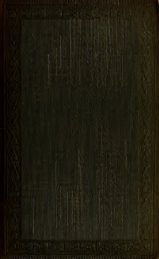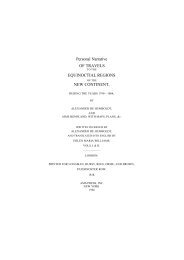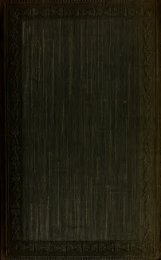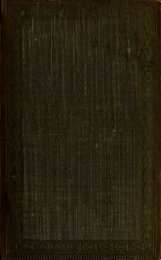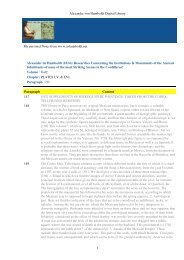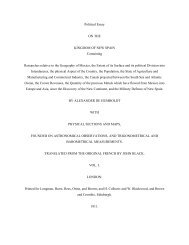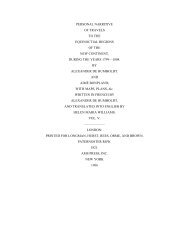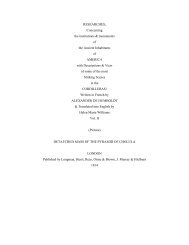- Page 1 and 2: PERSONAL NARRATIVE OF TRAVELS TO TH
- Page 3 and 4: CONTENTS. BOOK V. CHAPTER XIV. Page
- Page 5 and 6: [volume 4] JOURNEY TO THE EQUINOCTI
- Page 7 and 8: 3 which more than twenty thousand p
- Page 9 and 10: 5 that the province of Venezuela ha
- Page 11 and 12: 7 the sea. This new land, of which
- Page 13 and 14: 9 and serene weather. This coincide
- Page 15 and 16: 11 to have been observed, at Cumana
- Page 17 and 18: 13 It lasted five or six seconds, d
- Page 19: 15 scene of desolation and sorrow.
- Page 23 and 24: 19 not volcanic, have been formed b
- Page 25 and 26: 21 followed during ages a determina
- Page 27 and 28: 23 that are too easily adopted on t
- Page 29 and 30: 25 of Terra Firma appeared, since t
- Page 31 and 32: 27 attended with a tremendous noise
- Page 33 and 34: 29 and rises from a table-land, the
- Page 35 and 36: 31 fluids, which shook the ground o
- Page 37 and 38: 33 to the most recent lavas; the ot
- Page 39 and 40: 35 months, without shaking- the ear
- Page 41 and 42: 37 chapter, to take a rapid view of
- Page 43 and 44: 39 have belonged to the same chain,
- Page 45 and 46: 41 In opposing the objections of so
- Page 47 and 48: 43 is not the effect of one single
- Page 49 and 50: 45 Notwithstanding the intimate con
- Page 51 and 52: 47 work. I have first related a gre
- Page 53 and 54: 49 begin with the easternmost extre
- Page 55 and 56: 51 of 1797. These facts are well wo
- Page 57 and 58: 53 ejections of muddy substances at
- Page 59 and 60: 55 should be sent to the coast of V
- Page 61 and 62: 57 natural riches of a country, is
- Page 63 and 64: 59 displays itself in a very pictur
- Page 65 and 66: 61 garnets. These garnets, of a ver
- Page 67 and 68: 63 of the coast. In the interior of
- Page 69 and 70: 65 contained nearly eighty negroes;
- Page 71 and 72:
67 prices varied from six to eighte
- Page 73 and 74:
69 a produce of more than a pound a
- Page 75 and 76:
71 The cultivation of the coffee-tr
- Page 77 and 78:
73 Surinam, and in the West India i
- Page 79 and 80:
75 A clayey soil mixed with spangle
- Page 81 and 82:
77 sixty feet, is becoming rare, be
- Page 83 and 84:
79 filled with garnets, and contain
- Page 85 and 86:
81 fibres of the full-grown leaves
- Page 87 and 88:
83 Mr. de Xavedra, one of the most
- Page 89 and 90:
85 Bougainville, Cook, and Bligh*.
- Page 91 and 92:
87 one half was finished, Mr. de Ma
- Page 93 and 94:
89 keeps day and night between 36°
- Page 95 and 96:
91 in the ravine we found the moist
- Page 97 and 98:
93 hardly recognized the vestige of
- Page 99 and 100:
95 the mountains of Los Cocuyzas. I
- Page 101 and 102:
97 to grow paler compared with the
- Page 103 and 104:
99 that these variations are not al
- Page 105 and 106:
101 mentioned elsewhere the history
- Page 107 and 108:
103 aristocracy. Those who exercise
- Page 109 and 110:
105 sugar-canes, coffee, and planta
- Page 111 and 112:
107 the soil, and this happy influe
- Page 113 and 114:
109 here tierra blanca. The scienti
- Page 115 and 116:
111 15° to 19°; in Barbary, and i
- Page 117 and 118:
113 great importance there. The mos
- Page 119 and 120:
115 an umbrella over his head." Wit
- Page 121 and 122:
117 feet. The circumference of this
- Page 123 and 124:
119 has almost equalled that of Mex
- Page 125 and 126:
121 Cucuta, where, on the banks of
- Page 127 and 128:
123 rocky island in the lake, the w
- Page 129 and 130:
125 West Indies*. The cotton of the
- Page 131 and 132:
127 chose to apply themselves to th
- Page 133 and 134:
129 [volume 4] CHAPTER XVI. Lake of
- Page 135 and 136:
131 there are subterraneous communi
- Page 137 and 138:
133 chain of the coast, these rocky
- Page 139 and 140:
135 reëstablished or may we appreh
- Page 141 and 142:
137 the lake, and its breadth, is a
- Page 143 and 144:
139 Cocuyza to those of Torito and
- Page 145 and 146:
141 in 1796, three new islands appe
- Page 147 and 148:
143 the mind at rest, and for the h
- Page 149 and 150:
145 surrounded with steep decliviti
- Page 151 and 152:
147 waters of the canal of Languedo
- Page 153 and 154:
149 succeeding December. They remai
- Page 155 and 156:
151 the great lakes of Canada and t
- Page 157 and 158:
153 cannot be denied, particularly
- Page 159 and 160:
155 temperature of the air; either
- Page 161 and 162:
157 find their hydrostatic equilibr
- Page 163 and 164:
159 longer reckoning Morro and Cabr
- Page 165 and 166:
161 only three or four feet in leng
- Page 167 and 168:
163 birds, herons, flamingoes, and
- Page 169 and 170:
165 of our marshes. It is only afte
- Page 171 and 172:
167 Valencia some owe their origin
- Page 173 and 174:
169 whole body of the thermal water
- Page 175 and 176:
171 bottles at the very source, whi
- Page 177 and 178:
173 the bano of Mariara the volador
- Page 179 and 180:
175 that the poor man took us for s
- Page 181 and 182:
177 places; the jaguar skirting the
- Page 183 and 184:
179 imperfect in Terra Firma, becau
- Page 185 and 186:
181 of the cane at Teneriffe, and t
- Page 187 and 188:
183 three of which had already been
- Page 189 and 190:
185 their own chiefs. The introduct
- Page 191 and 192:
187 the plain is bare, and destitut
- Page 193 and 194:
189 they would be restored to a par
- Page 195 and 196:
191 Those who do not know the immen
- Page 197 and 198:
193 calls the river of Amazons, he
- Page 199 and 200:
195 descent almost continual from t
- Page 201 and 202:
197 inhabitants would be baptized o
- Page 203 and 204:
199 particles which seem to have be
- Page 205 and 206:
201 fresh and white corallites of t
- Page 207 and 208:
203 intercourse with the shore. Mr.
- Page 209 and 210:
205 are called the malady of the co
- Page 211 and 212:
207 the West, ran from West to East
- Page 213 and 214:
209 basin or little lake, which for
- Page 215 and 216:
211 they are thrown down with ropes
- Page 217 and 218:
213 glutinous milk, tolerably thick
- Page 219 and 220:
215 of fructification. It seems, ac
- Page 221 and 222:
217 months of the year not a single
- Page 223 and 224:
219 That amylaceous fecula, which t
- Page 225 and 226:
221 light on this fact during his s
- Page 227 and 228:
223 of the colour of the yolk of an
- Page 229 and 230:
225 solution. The membranes appear
- Page 231 and 232:
227 knots, or rather the interior c
- Page 233 and 234:
229 The sports in which the people
- Page 235 and 236:
231 Capitania General of Caraccas*,
- Page 237 and 238:
233 foliage of the erythrina and pl
- Page 239 and 240:
235 spring out even from the ligneo
- Page 241 and 242:
237 large plantations; but this sup
- Page 243 and 244:
239 at La Guayra, of which I am in
- Page 245 and 246:
241 trade with Trinidad, and the ot
- Page 247 and 248:
243 The first of these four product
- Page 249 and 250:
245 agricultural industry gradually
- Page 251 and 252:
247 as irritating the nervous syste
- Page 253 and 254:
249 Caribbean sea or the lake of Ma
- Page 255 and 256:
251 thick. There are three mines, w
- Page 257 and 258:
253 He retired into the woods, and
- Page 259 and 260:
255 constantly accumulated in the u
- Page 261 and 262:
257 NOTES TO THE FIFTH BOOK. NOTE A
- Page 263 and 264:
259 If they shed tears before thy t
- Page 265 and 266:
261 lactescent fungi, those species
- Page 267 and 268:
264 by Villa de Cura and San Juan,
- Page 269 and 270:
266 degree of intelligence. Thence
- Page 271 and 272:
268 araguato." This animal, having
- Page 273 and 274:
270 of some fruit-trees, is almost
- Page 275 and 276:
272 six toises higher than the vill
- Page 277 and 278:
274 sheets, streams that appear lik
- Page 279 and 280:
276 cavities, mixed with iron ocre,
- Page 281 and 282:
278 formations of rock cover the gn
- Page 283 and 284:
280 they might be taken at first si
- Page 285 and 286:
282 stratification a blackish blue
- Page 287 and 288:
284 greenish gray, or mountain gree
- Page 289 and 290:
286 and copper pyrites. These same
- Page 291 and 292:
288 those spheroidal masses, fissur
- Page 293 and 294:
290 the hornblendes better distingu
- Page 295 and 296:
292 Sun was almost at the zenith; t
- Page 297 and 298:
294 only some small portions to cul
- Page 299 and 300:
296 we have become better acquainte
- Page 301 and 302:
298 The steppes of Asia are all bey
- Page 303 and 304:
300 than toward the East, between t
- Page 305 and 306:
302 race, according to ancient and
- Page 307 and 308:
304 boundary. We have already descr
- Page 309 and 310:
306 These three transverse chains,
- Page 311 and 312:
308 limpias* in the same parallel,
- Page 313 and 314:
310 the East and South-East. When w
- Page 315 and 316:
312 the Rio Vichada aud the Meta a
- Page 317 and 318:
314 plains of Varinas afford some f
- Page 319 and 320:
316 far as the right bank of the In
- Page 321 and 322:
318 nations, living on milk and che
- Page 323 and 324:
320 the farm, and mark with a hot i
- Page 325 and 326:
322 run against the wind, stopping
- Page 327 and 328:
324 not flatter ourselves, that our
- Page 329 and 330:
326 shade, absorbs so much heat, th
- Page 331 and 332:
328 was, according to the distance
- Page 333 and 334:
330 had little fear of the presence
- Page 335 and 336:
332 this difference to the shelter
- Page 337 and 338:
334 is called the palma real de los
- Page 339 and 340:
336 us to fill our hats with the le
- Page 341 and 342:
338 in the midst of pastures. The s
- Page 343 and 344:
340 a loss of twelve per cent in th
- Page 345 and 346:
342 1548. He was an inhabitant of t
- Page 347 and 348:
344 who could compare his apparatus
- Page 349 and 350:
346 very lively, very energetic in
- Page 351 and 352:
348 into the pool, intoxicate or be
- Page 353 and 354:
330 of rising amid the prolonged st
- Page 355 and 356:
352 The gymnoti, like our eels, are
- Page 357 and 358:
354 the external skin; and rests up
- Page 359 and 360:
356 an electrical eel appeared to m
- Page 361 and 362:
358 of the fish with their fingers,
- Page 363 and 364:
360 and vigour. A gymnotus, that ha
- Page 365 and 366:
362 in the hands, which held the tw
- Page 367 and 368:
364 disposal, to be able to choose
- Page 369 and 370:
366 other. No person, on the contra
- Page 371 and 372:
368 often observed the same phenome
- Page 373 and 374:
370 gymnotus, the latter giving his
- Page 375 and 376:
372 several persons form the chain
- Page 377 and 378:
374 such or such a part of the skin
- Page 379 and 380:
376 if they succeed in procuring an
- Page 381 and 382:
378 As we advanced into the souther
- Page 383 and 384:
380 her resolution of going to one
- Page 385 and 386:
382 We have just seen, that the dro
- Page 387 and 388:
384 them with the hand. In the vall
- Page 389 and 390:
386 fracture, somewhat analogous to
- Page 391 and 392:
388 Llanos had settled at Guayaval,
- Page 393 and 394:
390 CHAPTER XVIII. San Fernando de
- Page 395 and 396:
392 full of fine paintings, contain
- Page 397 and 398:
394 inundations of Lower Egypt, and
- Page 399 and 400:
396 the immutable laws of nature, t
- Page 401 and 402:
398 wherever it was exposed to the
- Page 403 and 404:
400 They are three or four feet lon
- Page 405 and 406:
402 22° on account of the evaporat
- Page 407 and 408:
404 that are easily recognized. I s
- Page 409 and 410:
406 the day, from 1·7 to 2 lines o
- Page 411 and 412:
408 scarcely inhabited to above two
- Page 413 and 414:
410 it in the northern equinoctial
- Page 415 and 416:
412 Sun is lower.* The continuation
- Page 417 and 418:
414 conduct us. His dress denoted t
- Page 419 and 420:
416 and fire-arms, a few casks of b
- Page 421 and 422:
418 the Christian churches. They ar
- Page 423 and 424:
420 land inhabited only by tigers,
- Page 425 and 426:
422 sad and long experience has tau
- Page 427 and 428:
424 with nature, discourse daily tu
- Page 429 and 430:
426 The crocodiles of the Apure fin
- Page 431 and 432:
428 It had just killed a chiguire,
- Page 433 and 434:
430 water hog, given to the chiguir
- Page 435 and 436:
432 of a philosophy, which, indulge
- Page 437 and 438:
434 herons, and moorhens, which dis
- Page 439 and 440:
436 The night was calm and serene,
- Page 441 and 442:
438 They awaken the birds that live
- Page 443 and 444:
440 hours of the day, from 36° to
- Page 445 and 446:
442 us a nest of young iguanas, tha
- Page 447 and 448:
444 Apure and the Oroonoko. In plac
- Page 449 and 450:
446 gone toward the forest; and tur
- Page 451 and 452:
448 one of these animals, which was
- Page 453 and 454:
450 de manati, is used for lamps in
- Page 455 and 456:
452 species are so common, we were
- Page 457 and 458:
454 meridian height of α in the So
- Page 459 and 460:
456 state, when the Apure, like an
- Page 461 and 462:
458 help of their long tails, the s
- Page 463 and 464:
460 the retreat of wandering Indian
- Page 465 and 466:
462 formerly a part of the rounded
- Page 467 and 468:
464 within, coarse grained, and des
- Page 469 and 470:
466 physiognomy a singular hardness
- Page 471 and 472:
468 "that they swarm like worms in
- Page 473 and 474:
470 expedition for settling boundar
- Page 475 and 476:
472 natives of those countries have
- Page 477 and 478:
474 diversity of climates and the i
- Page 479 and 480:
476 be tamed, Caribbees and other I
- Page 481 and 482:
478 The stratum of eggs, however, i
- Page 483 and 484:
480 and membranous feet; the head v
- Page 485 and 486:
482 rough with pyramidal eminences*
- Page 487 and 488:
484 health of the animal, and that
- Page 489 and 490:
486 The three encampments formed by
- Page 491 and 492:
488 with water. In these troughs th
- Page 493 and 494:
490 in the Sun; and they break a co
- Page 495 and 496:
492 is not more than two fifths of
- Page 497 and 498:
494 placed in such a manner that it
- Page 499 and 500:
496 on the beach that, in going as
- Page 501 and 502:
498 of the fate of the companions o
- Page 503 and 504:
500 nautical miles. This is eight t
- Page 505 and 506:
502 period when the crocodiles of t
- Page 507 and 508:
504 so much toward the river that I
- Page 509 and 510:
506 many voices proclaiming to us t
- Page 511 and 512:
508 at the beach of Pararuma, where
- Page 513 and 514:
510 ample blue garments, their shor
- Page 515 and 516:
512 fixed for whole hours on the be
- Page 517 and 518:
514 These loaves, when heated, emit
- Page 519 and 520:
516 merchandize in great request. S
- Page 521 and 522:
518 in the neighbourhood of those*
- Page 523 and 524:
520 effaced, if the Indian expose h
- Page 525 and 526:
522 skin, the form of European garm
- Page 527 and 528:
524 manners. I have published these
- Page 529 and 530:
526 Europe*. We must not confound t
- Page 531 and 532:
528 When several of these little mo
- Page 533 and 534:
530 the fore hands are white withou
- Page 535 and 536:
532 skin. His name was Zerepe, a ve
- Page 537 and 538:
534 proportion as the men, who thin
- Page 539 and 540:
536 indispensable against the attac
- Page 541 and 542:
538 If it form at an equal height o
- Page 543 and 544:
540 which we see immediately above
- Page 545 and 546:
542 the allurement of gain, made mi
- Page 547 and 548:
544 Gili*, in general so exact, and
- Page 549 and 550:
546 cuipoo, maize giomu, the planta
- Page 551 and 552:
548 Whites, who inhabit the same vi
- Page 553 and 554:
550 "After leaving my mission," sai
- Page 555 and 556:
552 grasses that separate all the l
- Page 557 and 558:
554 shall mention only the paraguat
- Page 559 and 560:
556 double the mean rise of the Nil
- Page 561 and 562:
558 granite rocks. We passed on the
- Page 563 and 564:
560 we not admit that' the ancient
- Page 565 and 566:
562 feet broad. Our canoe was somet
- Page 567 and 568:
564 the horizon solitary palm-trees
- Page 569 and 570:
566 in this space fourteen Christia
- Page 571 and 572:
568 the Meta. The Guahiboes, who it
- Page 573 and 574:
570 They differ in nothing from the
- Page 575 and 576:
572 Oroonoko retained its habitual



